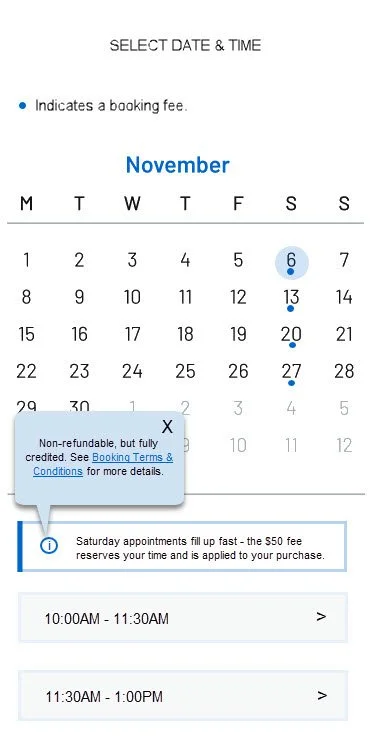“How can we reduce no-shows & drive commitment to our retail appointments?”
Testing a paid appointment feature to optimize bookings and improve user experience
January 2025 - Mid-March 2025
No-shows and last-minute cancellations for weekend appointments were draining store resources.
Our challenge was to test dynamic fees in real-time, making cost transparent while keeping the booking process smooth and intuitive for users.
Proposed Solution
I designed a booking flow to address both user and business needs:
Conditional fee display for eligible slots (e.g., Saturdays), which could be dynamically enabled or disabled.
Visual calendar indicators highlighting days with fees, helping users quickly identify premium time slots.
Real-time fee updates via API, ensuring accurate pricing at every step.
Clear in-flow explanations and payment steps, keeping the experience intuitive and transparent.
This approach ensured users understood the costs, while stores could experiment with revenue optimization and manage high-demand slots more effectively
Results
While the paid appointment feature was fully implemented, monitoring revealed that:
No significant increase in bookings occurred despite the new fee structure.
User clarity improved—visual indicators and in-flow explanations reduced confusion and support inquiries.
Infrastructure validated—real-time API updates and dynamic fee toggling worked reliably, establishing a framework for future experimentation.
Even though the feature was ultimately removed, it provided critical insights into user behavior and business priorities.
Note: This image is a mock-up for portfolio purposes. The design is based on the actual product experience, but some elements have been modified for presentation
Lessons Learned
This project offered key takeaways for designing revenue-driven features without compromising user experience:
Transparency is crucial: Users need clear, upfront information to make decisions confidently.
Test at small scale first: Rolling out new monetization features on limited slots helps uncover potential risks and refine strategy before broader implementation.
Infrastructure matters: Even if a feature is removed, building scalable, reliable systems creates value for future initiatives.
Takeaways
Insights from this experiment informed subsequent booking optimizations and loyalty initiatives:
Future efforts focus on reducing no-shows through communication and incentives rather than upfront fees.
The framework for dynamic slot management can support new experiments and revenue opportunities in a controlled, user-centered way.


